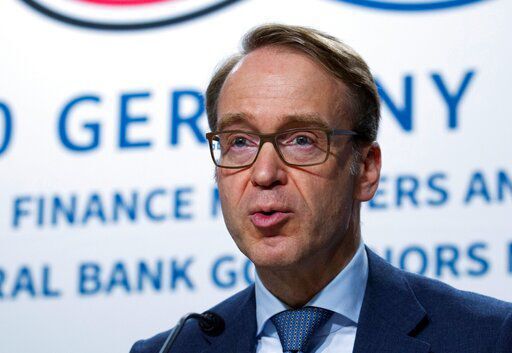BERLIN — The head of Germany’s central bank announced today that he will step down after a decade at the helm, removing a key hawkish voice from the European Central Bank’s governing council.
A statement from the Bundesbank said Jens Weidmann will leave office at the end of the year for personal reasons. National central bank governors in the 19-country eurozone have a seat on the ECB’s governing council, and in that position, Weidmann has been the chief skeptic of expansive stimulus policies, such as bond purchases.
“I have come to the conclusion that more than 10 years is a good measure of time to turn over a new leaf — for the Bundesbank, but also for me personally,” Weidmann said in a letter to the bank’s staff.
While he has only one vote on the 25-member governing council, his voice has been amplified because he comes from the largest eurozone economy. He has tended to urge restraint in measures that involve buying government bonds of member states, a step the European Central Bank has undertaken to drive down long-term interest rates and support growth.
“This comes at a crucial time for the ECB. The camp of the hawks is losing an important voice,” Carsten Brzeski, an economist at ING in Frankfurt, said in a research note.
Prospects of higher inflation, “herd immunity and an economy returning to pre-crisis levels before the end of the year are creating a strong argument to withdraw the ECB’s emergency stimulus and start reducing asset purchases,” Brzeski added. “Maybe the decision to do the latter will be Weidmann’s last success as Bundesbank president at the ECB’s December meeting.”
Weidmann is the fourth German member of the governing council to resign as the European Central Bank has taken a broader view of its mandate through bond purchases and ultra-low rates for extended periods.
Previously an adviser to outgoing German Chancellor Angela Merkel, Weidmann has headed the Frankfurt-based Bundesbank since May 2011. His eight-year term — his second — was due to run until 2027.
European Central Bank President Christine Lagarde said she respects but also “immensely” regrets the decision by Weidmann, 53, the long-serving member of the governing council.
“While Jens had clear views on monetary policy, I was always impressed by his search for common ground in the Governing Council, by his empathy for his Eurosystem colleagues, and his willingness to find a compromise,” Lagarde said in a statement.
Bundesbank presidents are nominated by the German government, and Weidmann’s announcement comes as Germany is in the process of putting together a new administration after the country’s Sept. 26 election. Merkel’s spokesman, Steffen Seibert, said the chancellor greeted it “with regret and with great respect.”
“It will now be the job of a new government … to find a successor who will continue the stability-oriented legacy of the Bundesbank,” Seibert said.
The center-left Social Democrats are about to start coalition talks with the environmentalist Greens and the pro-business Free Democrats on a new government that would send Merkel’s center-right Union bloc into opposition. Outgoing Finance Minister Olaf Scholz, who is expected to become chancellor, hopes to have the government in place by Christmas.
Scholz thanked Weidmann on Twitter for his “exceptional dedication.”


